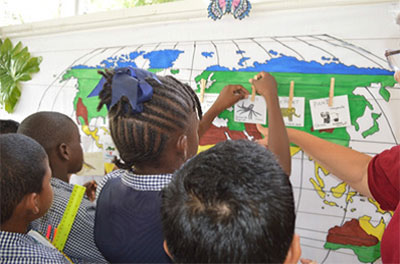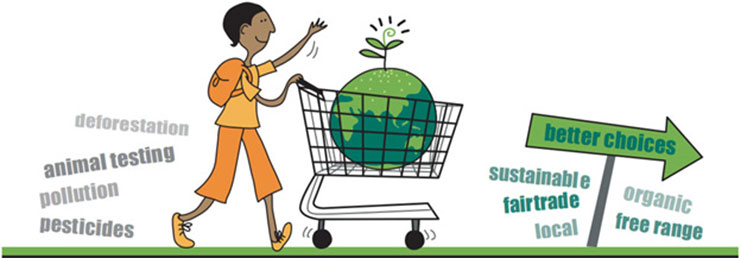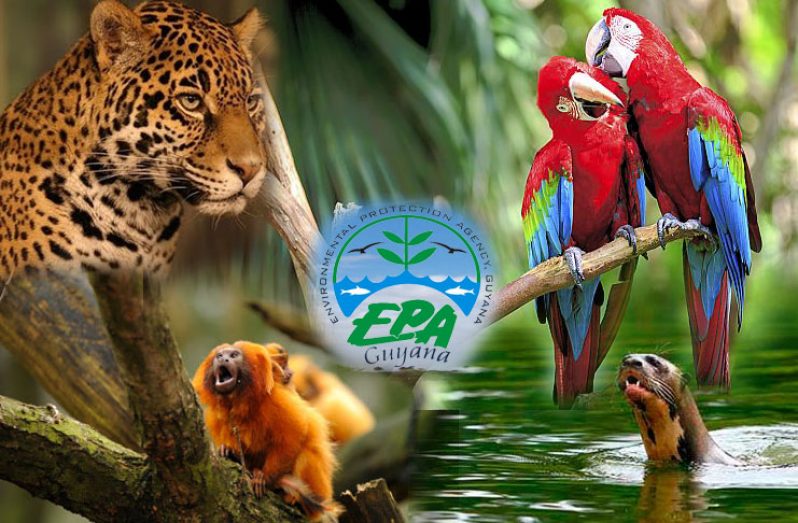IT seems as though every day we hear the terms Sustainable, Sustainable Development and Education for Sustainable Development (ESD). Sustainability is a global goal and yet many people are still confused as to what is meant by the term. Let’s look at the official definition of sustainable development, as determined by The Brundtland Report: Sustainable  development is development that meets the needs of the present without compromising the ability of future generations to meet their own needs.
development is development that meets the needs of the present without compromising the ability of future generations to meet their own needs.
A simple analogy could be the buffet line at a wedding: everyone in the front of the line knows that there are many more people following them and that available resources are limited. And yet some wedding guests will take more than they need, piling their plates with more than they can possibly eat, knowing full well that the people coming behind may suffer from not having enough. In a sustainable buffet line, the people at the front would take only what they need so that those coming in the future would also have enough.
 On September 21, 2016, President Brigadier David Granger addressed the General Assembly of the United Nations, saying that “world leaders have the opportunity and the responsibility to defend and improve the human environment for present and future generations.” He has proposed making Guyana into a “Green State.” The intention is excellent, but there is currently a gap between the stated objective and the capacity to achieve it. In order to make the leap from the present situation to the future Green State, education will need to be transformative.
On September 21, 2016, President Brigadier David Granger addressed the General Assembly of the United Nations, saying that “world leaders have the opportunity and the responsibility to defend and improve the human environment for present and future generations.” He has proposed making Guyana into a “Green State.” The intention is excellent, but there is currently a gap between the stated objective and the capacity to achieve it. In order to make the leap from the present situation to the future Green State, education will need to be transformative.
What is ESD? It is similar to traditional child-based education, and yet it is completely different. ESD brings more than facts and figures to education: it teaches values and gives students, teachers and their communities the skills for critical thinking and problem-solving. It is said that change is the only constant in the world. We know our lives will be different as time goes by, and new technologies are making transitions happen more and more rapidly.
As we educate our children, we have no idea of the changes that will occur before they  become adults. We cannot predict the opportunities and challenges that they will face in the world of tomorrow. Learning to read and do math provide an important foundation, but cannot alone take us forward. The goal of ESD is to create a world where everyone has the opportunity to acquire the knowledge, skills, values and attitudes necessary for a sustainable future and for positive societal transformation.
become adults. We cannot predict the opportunities and challenges that they will face in the world of tomorrow. Learning to read and do math provide an important foundation, but cannot alone take us forward. The goal of ESD is to create a world where everyone has the opportunity to acquire the knowledge, skills, values and attitudes necessary for a sustainable future and for positive societal transformation.
ESD addresses social issues such as poverty, violence, equality, sustainable communities, clean water, economic growth, protection of oceans and lands, responsible consumption and climate action. Not only schools but also communities and families are involved in ESD and creating solutions that are positive and sustainable for everyone.
Guyana has been awarded the honour (and good fortune) to be selected by UNESCO as the first pilot country for ESD in the Caribbean. Its unique position as the only pilot country in the western hemisphere means that the eyes of the world will be watching Guyana, hoping to learn from her experiences. With the support of UNESCO and funding from the government of Japan, the National Centre for Educational Resource Development (NCERD) at the Ministry of Education has the opportunity to create a comprehensive pilot programme of Education for Sustainable Development that will fill the gap and prepare Guyana for the future.
 As one of the first actions to promote ESD, NCERD teamed up with the Environmental Protection Agency (EPA) to present a two-day workshop for teachers on Education for Sustainable Development. Twenty-four teachers were encouraged to adapt their lessons and activities to fit into the ESD model. They saw ways to use games and activities to teach skills in decision-making, problem-solving and opinion-forming.
As one of the first actions to promote ESD, NCERD teamed up with the Environmental Protection Agency (EPA) to present a two-day workshop for teachers on Education for Sustainable Development. Twenty-four teachers were encouraged to adapt their lessons and activities to fit into the ESD model. They saw ways to use games and activities to teach skills in decision-making, problem-solving and opinion-forming.
They also learned how to infuse ESD and environmental messages and values into their normal lessons. Participants designed sample lessons in English, Social Studies, Mathematics and Science. They also learned about experiential learning, such as Sandwatch, where the students have hands-on experiences from which to form opinions and find answers. They were encouraged to create an environment within their classrooms that inspires curiosity and discovery.
They also heard that risk-taking and failures can be important learning experiences: asking students to try a different way to solve the same problem is better than punishing a wrong answer. This ESD workshop was the first of several that NCERD and EPA hope to offer to school teachers and community leaders.
You can share your ideas and questions by sending letters to: “Our Earth, Our Environment”, C/O ECEA Programme, Environmental Protection Agency, Ganges Street, Sophia, GEORGETOWN, or email us at: eit.epaguyana@gmail.com




.png)









